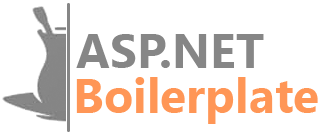In this document
Introduction
ASP.NET Boilerplate is integrated to ASP.NET Web API Controllers via Abp.Web.Api nuget package. You can create regular ASP.NET Web API Controllers as you always do. Dependency Injection properly works for regular ApiControllers. But you should derive your controllers from AbpApiController, which provides several benefits and better integrates to ASP.NET Boilerplate.
AbpApiController Base Class
This is a simple api controller derived from AbpApiController:
public class UsersController : AbpApiController
{
}
Localization
AbpApiController defines L method to make localization easier. Example:
public class UsersController : AbpApiController
{
public UsersController()
{
LocalizationSourceName = "MySourceName";
}
public UserDto Get(long id)
{
var helloWorldText = L("HelloWorld");
//...
}
}
You should set LocalizationSourceName to make L method working. You can set it in your own base api controller class, to not repeat for each api controller.
Others
You can also use pre-injected AbpSession, EventBus, PermissionManager, PermissionChecker, SettingManager, FeatureManager, FeatureChecker, LocalizationManager, Logger, CurrentUnitOfWork base properties and more.
Filters
ABP defines some pre-built filters for AspNet Web API. All of them are added to all actions of all controllers by default.
Audit Logging
AbpApiAuditFilter is used to integrate to audit logging system. It logs all requests to all actions by default (if auditing is not disabled). You can control audit logging using Audited and DisableAuditing attributes for actions and controllers.Authorization
You can use AbpApiAuthorize attribute for your api controllers or actions to prevent unauthorized users to use your controllers and actions. Example:
public class UsersController : AbpApiController
{
[AbpApiAuthorize("MyPermissionName")]
public UserDto Get(long id)
{
//...
}
}
You can define AllowAnonymous attribute for actions or controllers to suppress authentication/authorization. AbpApiController also defines IsGranted method as a shortcut to check permissions in the code.
See authorization documentation for more.
Anti Forgery Filter
AbpAntiForgeryApiFilter is used to auto protect ASP.NET Web API actions (including dynamic web api) for POST, PUT and DELETE requests from CSRF/XSRF attacks. See CSRF documentation for more.
Unit Of Work
AbpApiUowFilter is used to integrate to Unit of Work system. It automatically begins a new unit of work before an action execution and completes unit of work after action exucition (if no exception is thrown).
You can use UnitOfWork attribute to control behaviour of UOW for an action. You can also use startup configuration to change default unit of work attribute for all actions.
Result Wrapping & Exception Handling
ASP.NET Boilerplate does not wrap Web API actions by default if action has successfully executed. But it handles and wraps for exceptions. You can add WrapResult/DontWrapResult to actions and controllers if you need. You can change this default behaviour from startup configuration (using Configuration.Modules.AbpWebApi()...). See AJAX document for more about result wrapping.
Result Caching
ASP.NET Boilerplate adds Cache-Control header (no-cache, no-store) to the response for Web API requests. Thus, it prevents browser caching of responses even for GET requests. This behaviour can be disabled by the configuration.
Validation
AbpApiValidationFilter automatically checks ModelState.IsValid and prevents execution of the action if it's not valid. Also, implements input DTO validation described in the validation documentation.
Model Binders
AbpApiDateTimeBinder is used to normalize DateTime (and Nullable<DateTime>) inputs using Clock.Normalize method.
